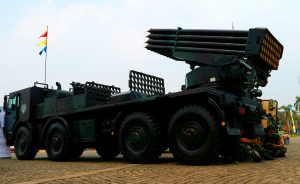When Indonesian President Joko “Jokowi” Widodo appointed his two-time presidential rival Prabowo Subianto as Minister of Defense in 2019, there were many skeptics. Prabowo ran a divisive campaign, and analysts wondered whether he would faithfully execute Jokowi’s agenda. But as he prepares for a third presidential run, Prabowo can campaign on a record of achievements at Indonesia’s Ministry of Defense, especially with regard to closing several big-ticket acquisitions.
Defense acquisition in Indonesia is a mix of operational need, fiscal balancing, and political deal-making. A 2012 law requires the use of domestic companies for military procurement. If foreign companies are used, the deal should include some type of technology or skill transfer. The Ministry of Finance must also approve foreign loans for major defense acquisitions. This means large procurements are influenced by economic and political concerns, as much as by the operational or strategic requirements of the Indonesian Armed Forces.
Several major programs that have moved forward on Prabowo’s watch illustrate this concept in action. The biggest one is a blockbuster deal with France’s Dassault to purchase six Rafale fighter jets with an option for 36 more. The deal was closed in 2022 and the first payment has been completed, which means the initial six units are going into production and scheduled to be delivered in 2026. If Indonesia moves forward with the full order, it will cost around $8.1 billion.
A press release from Indonesian state-owned aerospace firm PTDI states that technology transfers will be part of the deal, though it doesn’t get into specifics. Airbus, which owns 9.9 percent of Dassault, has been a long-time partner of PTDI. We should expect that the Rafale deal, as well as a recent purchase of two A400 Atlas transport aircraft directly from Airbus, will involve the transfer of technology, skills, and licenses from Airbus and Dassault to PTDI and possibly other Indonesian firms. The Indonesian Armed Forces happen to need these aircraft, but the development of indigenous production capabilities is an important aspect of the larger acquisition strategy.
Something similar happened with the recent purchase of the C-130J-30 Super Hercules from Lockheed Martin. Indonesia has an aging fleet of C-130Hs and is looking to upgrade. The first C-130J was delivered to Jakarta early this year, with four more in production and expected to arrive over the next two years. As part of the deal PT Garuda Maintenance Facility Aero Asia Tbk (GMFI), a subsidiary of state-owned carrier Garuda, received certification from Lockheed Martin to perform maintenance and overhaul on the existing C-130Hs. Again, Indonesia needs these aircraft but it wants to get more than just airframes out of the deal. It wants the transfer of skills, production, and maintenance capabilities.
Another blockbuster deal that has so far not come together is the purchase of 36 F-15s from Boeing. The deal, valued at $13.9 billion, received authorization from the U.S. State Department but doesn’t seem to be going anywhere. Reportedly, the main sticking point is financing and payment, with Boeing concerned about the ability of the Indonesian government to cover the price tag. Another sticking point may be related to technology transfers. If Indonesia goes ahead with such a large purchase, they will be expecting technology offsets and upskilling and Boeing may not be as receptive to such demands as Dassault or Airbus. At the end of the day, even if the U.S. government wants the deal to move forward Boeing is answerable to its shareholders and will be guided primarily by its commercial interests.
Generally speaking, French defense companies, many of which have a degree of state ownership, have shown a willingness to give Indonesia more of what it really wants when it comes to big-ticket acquisitions. Not just expensive hardware and systems, but know-how and technology that can potentially boost indigenous production capabilities. Indonesia is in advanced talks with France’s Naval Group, for instance, to purchase a pair of Scorpene submarines. The details are still being worked out, but at least some of the production is likely to take place at state-owned shipbuilder PT PAL’s facility in Surabaya.
In Indonesia, military modernization is not just about budgets. It’s about balancing the operational and strategic needs of the Armed Forces against the political imperative to contribute to economic development. In recent years, when push comes to shove a number of complex and expensive procurement projects, often involving foreign defense companies and billions of dollars in loans, have been de-bottlenecked and moved forward.
Government spending on maintenance and procurement of major defense systems has steadily increased since 2019, reaching an all-time high of just over $3 billion in 2022. Part of this is because overall public spending increased during the pandemic. But part of it is also that Prabowo Subianto as Defense Minister has been able to leverage considerable political capital and close big deals. How this dynamic will evolve in the future, as Prabowo shifts his attention toward chasing the presidency for a third time, remains to be seen.

































